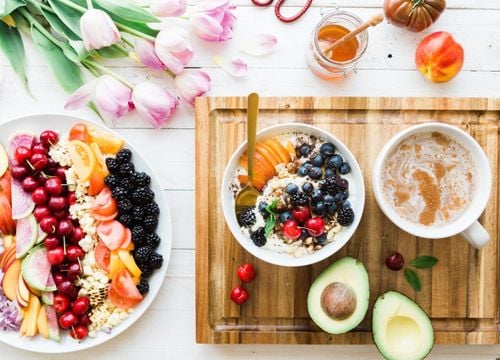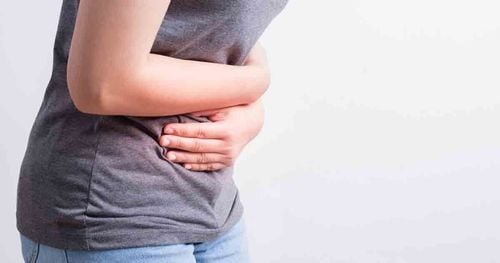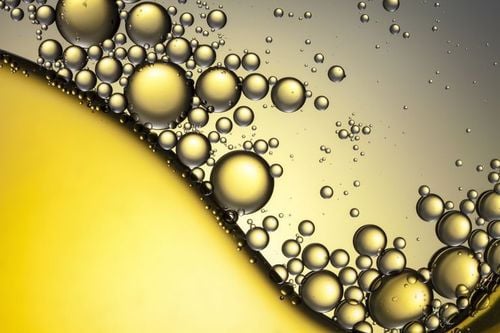When you engage in high-intensity activities such as cycling, running, or weight training can sometimes lead to muscle pain. Muscle pain not only makes you feel uncomfortable but also disrupts your training regimen and affects your daily routine. However, there are many methods to relieve muscle pain, minimize muscle damage caused by exercise, and increase the speed of the recovery process. Below are top 10 foods and drinks to support muscle recovery.
1. Cherry juice
Cherry juice benefits for both professional athletes and beginners in sports. Studies have shown that cherry juice has an advantage in muscle recovery and reduces the effects of delayed onset muscle soreness (DOMS).
DOMS is also known as 'muscle fever', is the feeling of pain, stiffness in the muscles after exercise .DOMS results from temporary muscle damage, which typically happens after intense or complex workouts. Exercise increases oxidative stress, causes cell damage, and inflammation. However, antioxidants in foods and drinks can reduce these side effects and facilitate the fastest muscle recovery.
Cherry juice contains many plant compounds called anthocyanins. They have powerful anti-inflammatory and antioxidant properties, and as such, they can reduce the sensation of pain and exercise-induced muscle damage (EIMD).
The antioxidant and anti-inflammatory properties of cherries can help reduce the odds that exercise causes muscle damage and cure muscle soreness. Therefore, drinking cherry juice promotes rapid muscle recovery after exercise by improving strength, reducing inflammation, and reducing lipid oxidation levels.
2. Watermelon and watermelon juice
Watermelon has a sweet taste, contains a lot of water and nutrients. Therefore, supplementing with watermelon will help keep the body hydrated and maintain electrolyte levels. Eating watermelon regularly can reduce symptoms of dehydration after intense exercise, such as cramps, fatigue, dizziness...
Watermelon contains a lot of antioxidants, has the ability to prevent the effects of free radicals, slows down the degenerative process and protects organs in the body. Some of the antioxidants found in watermelon such as vitamin C, lycopene, carotenoids, cucurbitacin E,...
Vitamin C and lycopene found in watermelon can reduce the risk of inflammation and control symptoms of pain in joints. Besides, they also slow down the aging process, inhibit cartilage degeneration in people with chronic arthritis. Additionally, the citrulline in watermelon is an amino acid that has the ability to reduce muscle pain and has the effect of producing nitric oxide - a component that helps dilate blood vessels and increase blood flow to the limbs.Regular citrulline supplementation from watermelon can increase muscle endurance and performance.Moreover, this ingredient also helps to reduce muscle soreness after exercise and hard labor.
Therefore, watermelon remains a guaranteed choice for exercise enthusiasts, with significant effects on muscle soreness.
Watermelon has a sweet taste, contains a lot of water and nutrients. Therefore, supplementing with watermelon will help keep the body hydrated and maintain electrolyte levels. Eating watermelon regularly can reduce symptoms of dehydration after vigorous exercise, exercise such as cramps, fatigue, dizziness...
Watermelon contains a lot of antioxidants, has the ability to prevent Prevents the effects of free radicals, slows down the degenerative process and protects organs in the body. Some of the antioxidants found in watermelon such as vitamin C, licopene, carotenoids, cucurbitacin E,...
Vitamin C and lycopene found in watermelon can reduce the risk of inflammation and control symptoms. pain in joints. Besides, they also slow down the aging process, inhibit cartilage degeneration in people with chronic arthritis. Not only that, the citrulline in watermelon is an amino acid that has the ability to reduce muscle pain and has the effect of producing nitric oxide - a component that helps dilate blood vessels and increase blood flow to the extremities. Regular citrulline supplementation can increase muscle endurance and performance. Moreover, this ingredient also helps to reduce muscle soreness after exercise and hard labor.
Therefore, watermelon remains a guaranteed choice for exercise enthusiasts, with significant effects on muscle soreness.
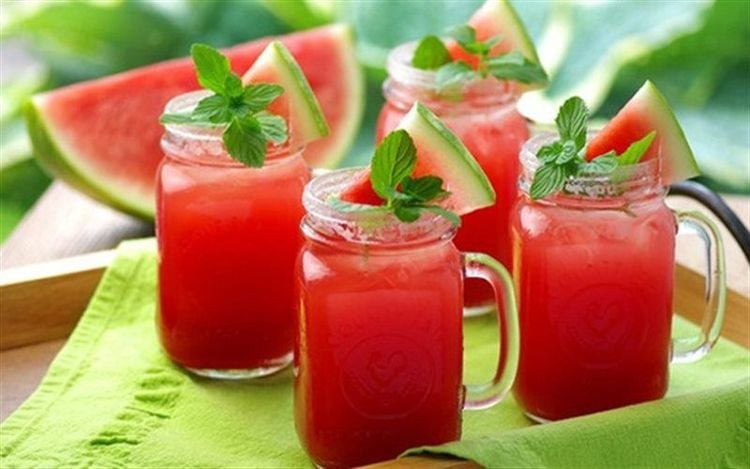
3. “Fatty Fish”
“Fatty fish” like sardines, cod, tuna, or salmon are a healthy food, rich in protein and omega-3 fatty acids, which are important for our health. In addition, these substances not only help reduce inflammation but also lower the risk of heart disease.
Fish is a great source of protein with high biological value, a multi-energy nutrient that supports muscle regeneration after exercise-induced damage. Fatty fish is also high in omega-3 fats, which may help reduce DOMS, fight inflammation, and enhance muscle growth.
4. Pomegranate juice
Pomegranate juice is loved for its brilliant red color, delicious taste and unexpected health effects. Pomegranate juice contains more than 100 phytochemicals – compounds with antioxidant and anti-inflammatory properties that may help prevent cancer, support immunity and promote muscle recovery.
Many studies show that pomegranate juice and pomegranate supplements can reduce DOMS, decrease signs of inflammation and accelerate muscle recovery due to its high concentration of antioxidants. It helps reduce inflammation throughout the body and prevent oxidative stress and damage.
5. Beetroot juice
Beetroot is a common and nutritious food found in many households. Beetroot is rich in nitrates and betalains. The nitrates in beetroot can help deliver oxygen to the cells of the muscles and improve the efficiency of cellular activities, production, and cellular energy supply. Meanwhile, betalain can reduce inflammation and damage caused by oxidation.
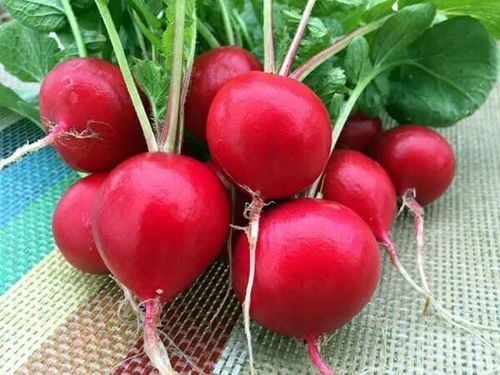
6. Whey Protein
Some studies show that whey protein can accelerate muscle recovery after exercise in both athletes and amateurs. Whey protein can also improve muscle function after exercise and increase immunity.
Whey protein is absorbed much faster than natural intake, helping to accelerate muscle recovery. With no preparation required, just mix 1 scoop of whey protein with water and drink, and it quickly digests, produces more than 20 types of amino acids and goes into building new muscle fibers, aiding in effective recovery and muscle growth.
7. Eggs
Eggs are known for their high nutritional value and are preferred by athletes because of their high protein content. Eating eggs after a workout helps stimulate muscle recovery. Researchers suggest that egg yolks are rich in nutrients that provide vitamins, minerals, and fatty acids, such as vitamin A, selenium, zinc, and acids palmitate, which may increase muscle protein synthesis.
8. Milk
Milk and dairy products like yogurt and cottage cheese are often used as post-workout fuel. Because milk provides a lot of protein that helps muscle recovery. Additionally, milk and dairy products also contain carbs and when combined with protein together will aid in muscle growth. In addition, milk is a food with high nutritional value, containing all the groups of substances necessary for the body such as proteins, lipids, sugars, vitamins and minerals. However, it is necessary to avoid drinking milk when hungry, should not drink milk before it has undergone the production process, should not drink too thick milk or limit adding too much sugar into milk.
9. Starchy vegetables
Vegetables are not only a source of fiber as well as essential vitamins for the body, but also a food source of beneficial starch for the body. During intense exercise, glycogen, a storage form of glucose in your muscles, is depleted. Having enough glycogen in the muscles promotes optimal training performance. So it's important to replenish these glycogen stores after a workout.
Eating carbohydrate-rich foods promotes glycogen replenishment in muscles. Starchy vegetables like sweet potatoes, pumpkin, and potatoes are a healthy post-workout carbohydrate option. Combining starchy vegetables with a protein source like eggs or chicken breast is an effective and delicious way to replenish glycogen stores while supplying the necessary protein for faster muscle recovery.
10. Coffee
Many studies show that drinking coffee before or after exercise can help reduce DOMS (Delayed Onset Muscle Soreness) because the caffeine in coffee can block adenosine receptors. Adenosine is a chemical released after injury. It damages muscles during exercise. In particular, men reduced DOMS more after consuming caffeine than women.
Tips for reducing muscle pain:
-In addition to foods and drinks, other factors can promote muscle recovery and reduce muscle soreness after exercise.
-Get Enough Sleep: Lack of sleep can reduce your muscle performance and impair recovery.
-Compression Therapy: Tools like compression gloves and socks can enhance muscle recovery and improve strength in treated muscles.
-Heat Therapy: Cold water immersion can promote muscle healing, reduce inflammation and DOMS.
-Massage Therapy: Studies suggest that massage can improve muscle performance and reduce DOMS.
Try applying these methods to find out for yourself which methods are suitable and bring the best recovery effect.
To arrange an appointment, please call HOTLINE or make your reservation directly HERE. You may also download the MyVinmec app to schedule appointments faster and manage your reservations more conveniently.
Reference source: healthline.com



